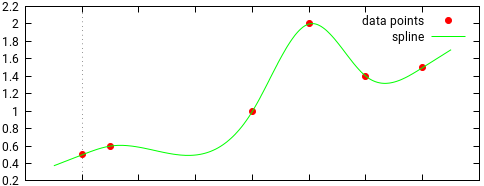This is a lightweight implementation of cubic splines to interpolate points f(xi) = yi with the following features.
- available spline types:
- cubic C2 splines: global, twice continuously differentiable
- cubic Hermite splines: local, continuously differentiable (C1)
- boundary conditions: first and second order derivatives can be specified, not-a-knot condition, periodic condition is not implemented
- extrapolation
- linear: if first order derivatives are specified or 2nd order = 0
- quadratic: if 2nd order derivatives not equal to zero specified
- monotonicity can be enforced (when input is monotonic as well)
The library is a header-only file with no external dependencies and can be used like this:
#include <vector>
#include "spline.h"
...
std::vector<double> X, Y;
...
// default cubic spline (C^2) with natural boundary conditions (f''=0)
tk::spline s(X,Y); // X needs to be strictly increasing
double value=s(1.3); // interpolated value at 1.3
double deriv=s.deriv(1,1.3); // 1st order derivative at 1.3
std::vector<double> solutions = s.solve(0.0); // solves s(x)=0.0
...The constructor can take more arguments to define the spline, e.g.:
// cubic Hermite splines (C^1) with enforced monotonicity and
// left curvature equal to 0.0 and right slope equal 1.0
tk::spline s(X,Y,tk::spline::cspline_hermite, true,
tk::spline::second_deriv, 0.0,
tk::spline::first_deriv, 1.0);This is identical to (must be called in that order):
tk::spline s;
s.set_boundary(tk::spline::second_deriv, 0.0,
tk::spline::first_deriv, 1.0);
s.set_points(X,Y);
s.make_monotonic();Splines are piecewise polynomial functions to interpolate points (xi, yi). In particular, cubic splines can be represented as
- f(x) = ai + bi (x-xi) + ci (x-xi)2 + di (x-xi)3, for all x in [xi, xi+1)
- f(xi)=yi
The following splines are available.
tk::spline::cspline: cubic C2 spline- twice continuously differentiable, e.g. f'(xi) and f''(xi) exist
- this, together with boundary conditions uniquely determines the spline
- requires solving a sparse equation system
- is a global spline in the sense that changing an input point will impact the spline everywhere
- setting first order derivatives at the boundary will break C2 at the boundary
tk::spline::cspline_hermite: cubic Hermite spline- once continuously differentiable (C1)
- first order derivatives are specified by finite differences, e.g. on a uniform x-grid:
- f'(xi) = (yi+1-yi-1)/(xi+1-xi-1)
- is a local spline in the sense that changing grid points will only affect the spline around that grid point in a few adjacent segments
A function to enforce monotonicity is available as well:
tk::spline::make_monotonic(): will make the spline monotonic if input grid points are monotonic- this function can only be called after
set_points(...)has been called - it will break C2 if the original spline was C2 and not already monotonic
- it will break boundary conditions if it was not monotonic in the first or last segment
- this function can only be called after
